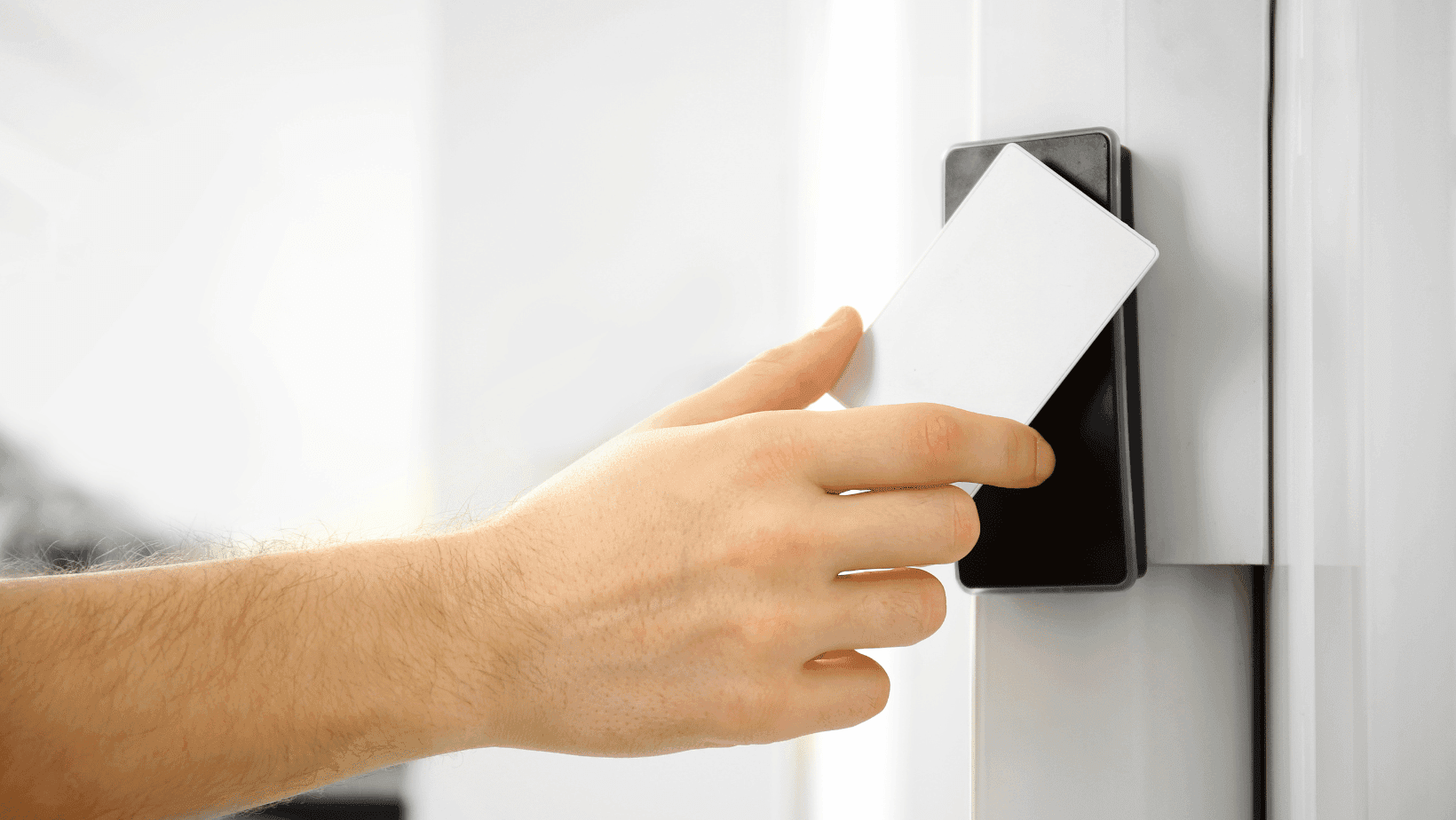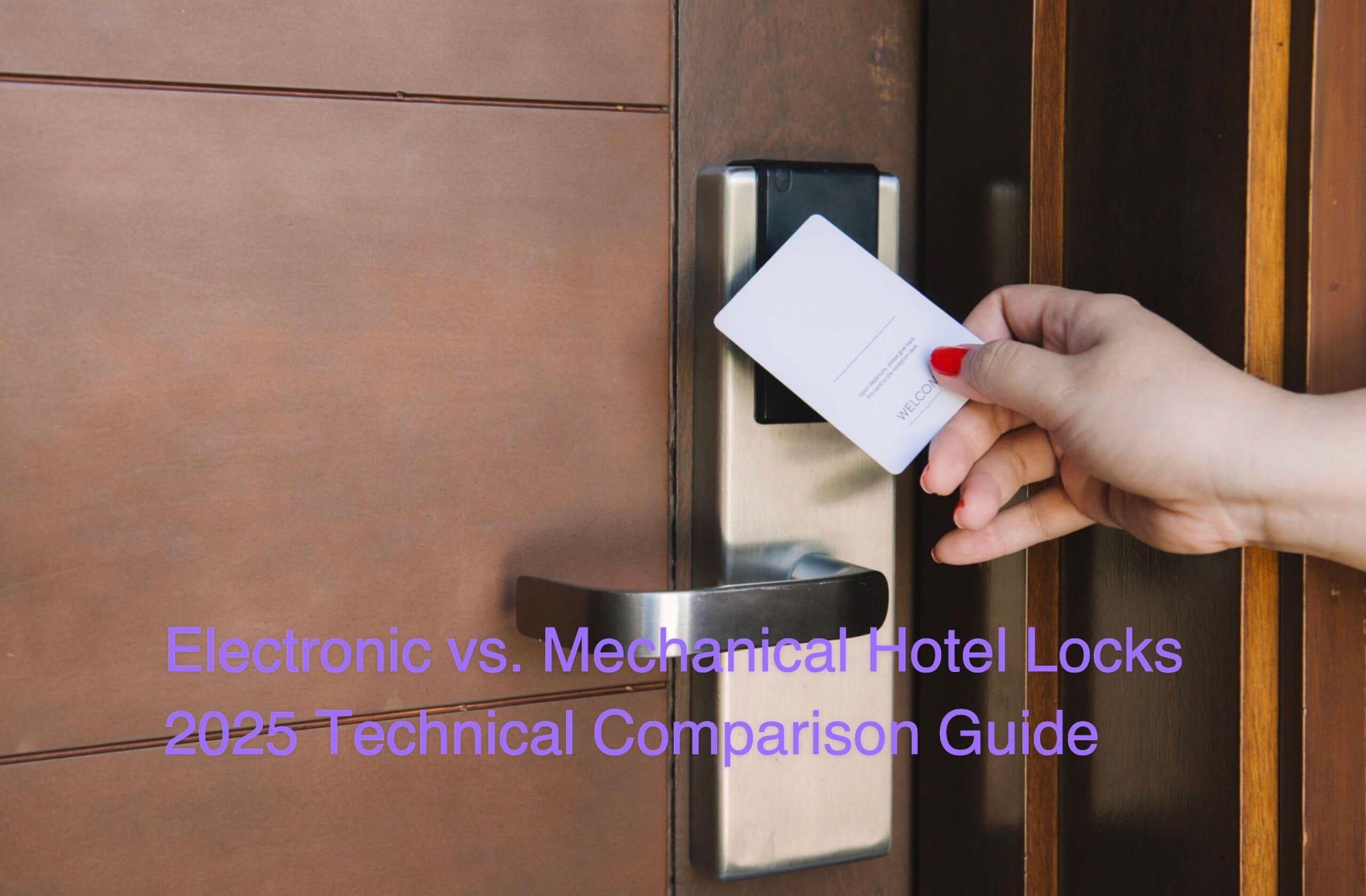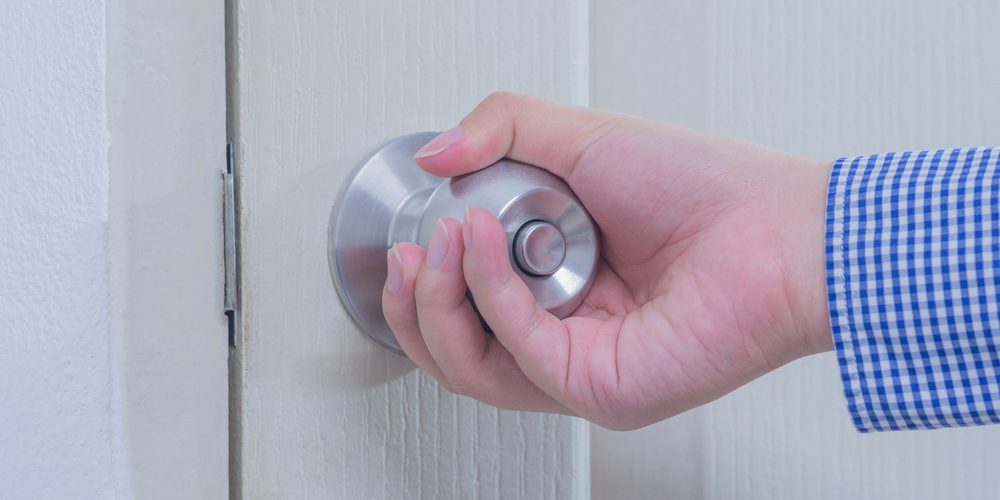In today’s competitive hospitality landscape, hotels constantly seek ways to elevate guest experiences while ensuring top-notch security. A crucial aspect of achieving this delicate balance lies in choosing the right hotel door lock system. Traditional keys are becoming obsolete, making way for advanced technologies like RFID, fingerprint, and mobile key systems. But with various options available, selecting the best fit for your property can feel overwhelming. This comprehensive guide will explore the pros and cons of each hotel door lock technology, enabling you to make an informed decision that aligns with your security needs and guest expectations.
RFID Hotel Locks
What is RFID Technology?
RFID stands for Radio-Frequency Identification. This technology uses electromagnetic fields to automatically identify and track tags attached to objects. An RFID system comprises two main components:
- RFID Tag: A microchip attached to an antenna that stores information about the object.
- RFID Reader: A device that emits radio waves to activate the tag and read its data.
How RFID Hotel Locks Work
RFID hotel door locks utilize keycards embedded with RFID tags. Guests tap their card against the lock’s reader, transmitting the encoded information. The lock verifies the data and grants access if it matches the authorized credentials.
Pros of RFID Hotel Locks
- Enhanced Security: RFID technology encrypts data, making it difficult for unauthorized individuals to duplicate keycards. The ability to deactivate lost or stolen cards remotely adds an extra layer of security.
- Convenience: Guests appreciate the ease of use associated with RFID locks. A simple tap is all it takes to unlock the door, eliminating the hassle of traditional keys.
- Operational Efficiency: RFID locks can be integrated with hotel management software, automating tasks like room assignments and access tracking. This integration streamlines operations and reduces administrative burdens for hotel staff.
- Cost-Effectiveness: RFID locks are generally more affordable than biometric or mobile key systems, making them an attractive option for hotels seeking a balance between security and budget.
- Durability: The Electronic Hotel Lock Base RFID 9004 Series, a product offered by Be-Tech Lock, is constructed from high-quality stainless steel, known for its durability in demanding environments.
- Audit Trails: Many RFID lock systems offer detailed audit trails, logging every access attempt. This feature enables hotel management to monitor security and investigate any suspicious activity.
- Customizable Access: RFID keycards can be programmed to grant access to specific areas, like guest rooms, fitness centers, or parking garages. This flexibility allows hotels to manage access levels for different guest categories.
- Improved Guest Experience: The contactless nature of RFID locks aligns with the increasing demand for touchless solutions in the hospitality industry. Guests appreciate the hygiene and convenience of using RFID keycards.
- Future-Proof Technology: RFID technology is constantly evolving, with advancements in security and functionality. Be-Tech Lock’s Electronic Hotel Lock Base RFID 9004 Series utilizes FLASH RAM memory, enabling easy updates as technology progresses.
Cons of RFID Hotel Locks
- Keycard Loss: Guests can still lose their keycards, requiring replacements and potentially causing inconvenience.
- Limited Personalization: While RFID cards offer some level of customization, they don’t provide the same level of personalization as mobile keys.
- Potential for RFID Skimming: Although rare, there is a slight risk of RFID skimming, where unauthorized individuals use devices to steal card information.
Fingerprint Hotel Locks
What is Biometric Technology?
Biometric technology uses unique biological characteristics, such as fingerprints, facial features, or iris patterns, to identify individuals. This technology is widely adopted in various security applications due to its high level of accuracy and difficulty in replication.
How Fingerprint Hotel Locks Work
Fingerprint hotel door locks require guests to enroll their fingerprints during check-in. The lock scans and stores the fingerprint data, converting it into a unique digital template. When a guest wants to unlock the door, they place their finger on the scanner. The lock compares the live scan with the stored template, granting access only if a match is found.
Pros of Fingerprint Hotel Locks
- Unmatched Security: Fingerprints are unique to each individual, making them incredibly difficult to duplicate. This feature provides a high level of security, eliminating the risk of lost or stolen keys.
- Convenience: Once enrolled, guests can unlock doors without carrying any physical keys or cards. This convenience is particularly appealing to travelers who prefer minimalist packing.
- Enhanced Guest Experience: Fingerprint locks add a touch of modernity and sophistication to hotels, contributing to a positive guest experience.
- Audit Trails: Similar to RFID locks, fingerprint lock systems maintain audit trails, allowing hotels to track access attempts and identify any security breaches.
Cons of Fingerprint Hotel Locks
- Higher Cost: Fingerprint locks typically involve a higher initial investment compared to RFID locks.
- Potential for False Rejection: Factors like dry skin, dirt, or cuts on the finger can affect the accuracy of fingerprint scanning, leading to false rejections.
- Hygiene Concerns: Some guests may have hygiene concerns about using shared fingerprint scanners, particularly in the wake of heightened awareness about infectious diseases.
Mobile Key Hotel Locks
What are Mobile Keys?
Mobile keys utilize smartphones or other mobile devices as digital keys to unlock doors. These systems leverage Bluetooth Low Energy (BLE) technology to communicate between the lock and the mobile device.
How Mobile Key Hotel Locks Work
Guests download the hotel’s mobile app and register their device during check-in. The app generates a secure digital key that is transmitted to the lock via BLE. When a guest approaches their room, their device communicates with the lock, granting access if the digital key is valid.
Pros of Mobile Key Hotel Locks
- Convenience: Guests don’t need to carry physical keys or cards, relying solely on their smartphones for access. This convenience aligns with the growing trend of mobile-first experiences in the hospitality industry.
- Enhanced Guest Experience: Mobile keys contribute to a modern and tech-savvy guest experience, allowing for seamless check-in and room access.
- Personalization: Mobile keys can be used to deliver personalized messages or offers to guests, enhancing their overall stay.
- Reduced Contact Points: Mobile keys eliminate the need to touch shared keycards or scanners, promoting hygiene and safety.
- Remote Check-In/Check-Out: Some mobile key systems allow guests to check in and check out remotely, further enhancing convenience.
Cons of Mobile Key Hotel Locks
- Technology Dependence: Guests need a compatible smartphone and a reliable internet connection to use mobile keys. Not all guests may have access to these technologies.
- Battery Drain: Using BLE for communication can drain the battery of both the lock and the mobile device, requiring regular charging and maintenance.
- Security Concerns: While mobile keys offer robust security features, there is always a potential risk of hacking or data breaches associated with any digital technology.
Which Hotel Lock is Best?
Ultimately, the best hotel lock system depends on your property’s specific needs, budget, and target audience.
Here’s a table summarizing the key considerations:
| Feature | RFID | Fingerprint | Mobile Key |
|---|---|---|---|
| Security | High, with encryption and remote deactivation capabilities | Very high, using unique biometric data | High, with encryption and potential for multi-factor authentication |
| Convenience | High, with contactless keycards | High, eliminating the need for keys or cards | Highest, using smartphones for access |
| Cost | Generally affordable | Higher initial investment | Moderate to high, depending on features and integration |
| Guest Experience | Good, with ease of use and contactless access | Very good, with modern technology and personalized access | Excellent, with mobile-first convenience and personalization |
| Suitability | Suitable for most hotels, offering a balance of security and cost | Ideal for properties seeking high security and modern amenities | Best for tech-savvy hotels targeting younger demographics and offering modern amenities |
Conclusion
The decision of choosing between RFID, fingerprint, and mobile key hotel locks is a crucial one that can significantly impact your property’s security and guest satisfaction. By carefully considering the pros and cons of each technology and understanding your specific needs, you can select the best system that enhances your operations and elevates guest experiences. Partnering with a reputable hotel lock system manufacturer, such as Be-Tech Lock, can provide valuable expertise and support throughout the selection and implementation process.
Take the first step towards enhancing your hotel’s security and guest experience by exploring the innovative hotel lock solutions offered by Be-Tech Lock.









